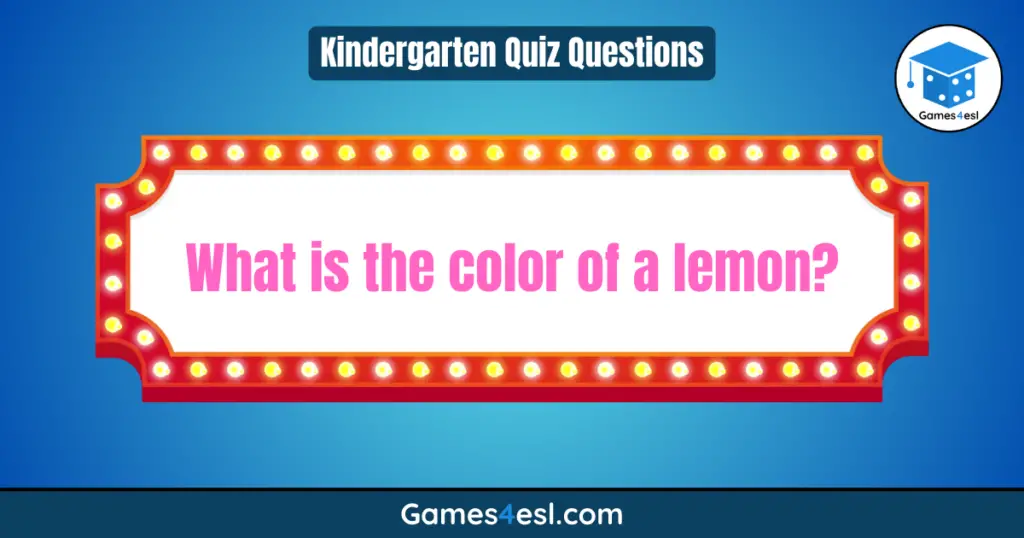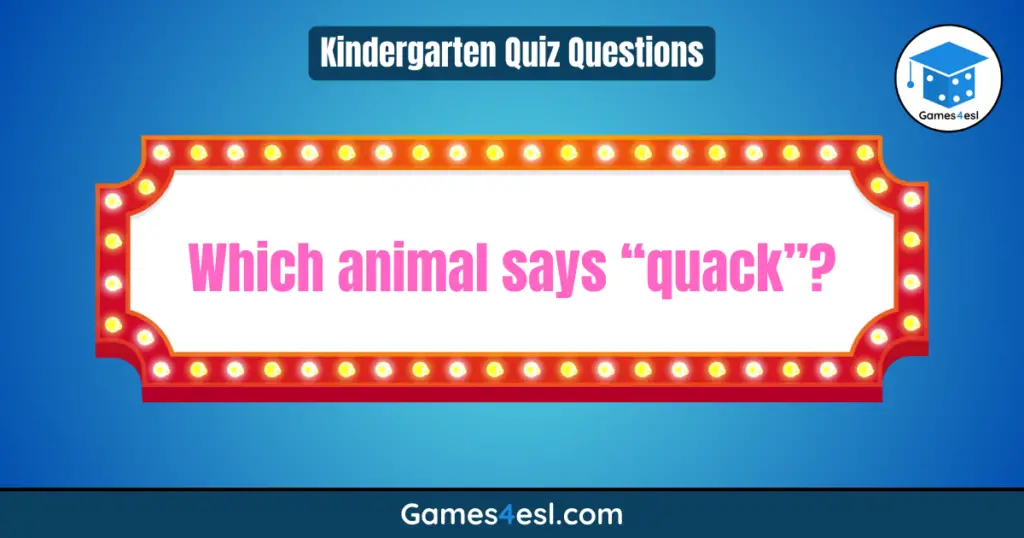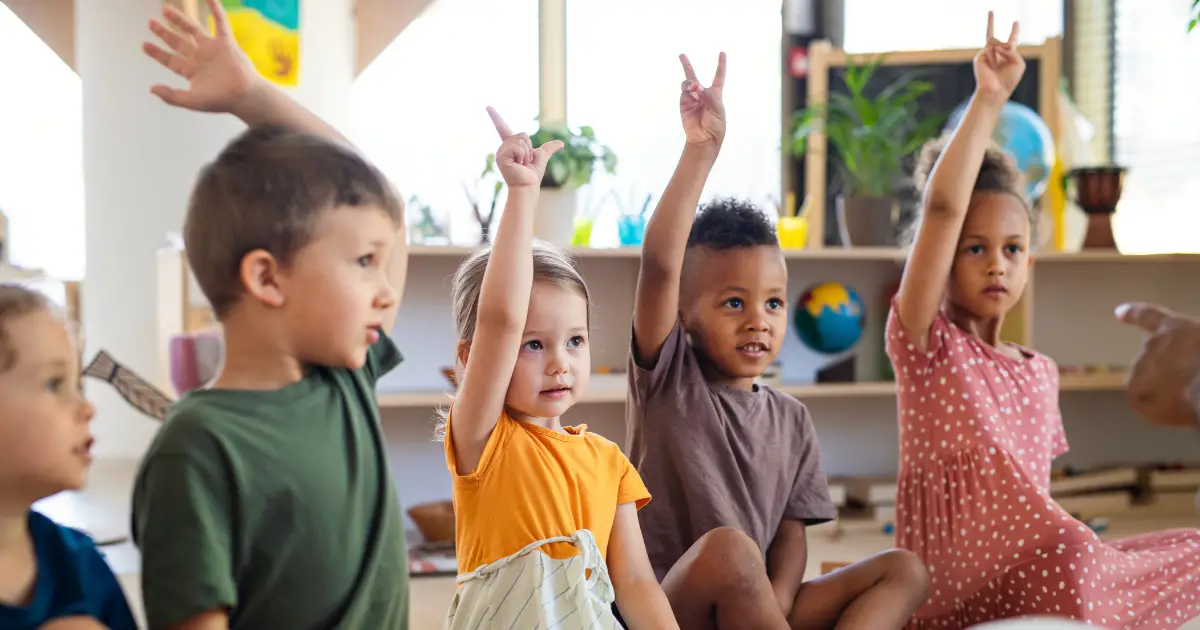75 Fun And Easy Trivia Questions For Kindergarten
If you teach kindergarten, then you probably know that kids love quizzes! Not only are quizzes super fun, but they are also perfect for sparking curiosity and encouraging learning in a playful way. All you need to make a quiz for your kindergarten class is some fun and easy quiz questions. Below, you’ll find 75 trivia questions for kindergarten, covering topics that young learners typically study, including shapes, colors, animals, numbers, fruits and vegetables, opposites, seasons, the alphabet, general knowledge, and more.
Trivia Questions For Kindergarten
Shapes

- Which shape has three sides? (Answer: Triangle)
- What shape is a coin? (Answer: Circle)
- Which shape has four equal sides? (Answer: Square)
- Which shape has no corners? (Answer: Circle)
- What is the shape of a pizza box? (Answer: Square)
- What shape is a book? (Answer: Rectangle)
- Which shape has six sides? (Answer: Hexagon)
- What shape is a door? (Answer: Rectangle)
Colors

- What color is the sky on a clear day? (Answer: Blue)
- What is the color of a banana? (Answer: Yellow)
- What is the color of grass? (Answer: Green)
- What is the color of a lemon? (Answer: Yellow)
- What is the color of an orange? (Answer: Orange)
- What is the color of a stop sign? (Answer: Red)
- What is the color of the sun? (Answer: Yellow)
- What is the color of the moon? (Answer: White/Gray)
- What is the color of the sea? (Answer: Blue)
- What color are strawberries? (Answer: Red)
- What color is the inside of an orange? (Answer: Orange)
- What color are blueberries? (Answer: Purple)
- What is the color of a pumpkin? (Answer: Orange)
Animals

- Which animal says “moo”? (Answer: Cow)
- Which animal is known as “man’s best friend”? (Answer: Dog)
- What sound does a cat make? (Answer: Meow)
- Which animal roars and is known as the king of the jungle? (Answer: Lion)
- Which animal has a long trunk? (Answer: Elephant)
- What animal lives in a pond and says “ribbit”? (Answer: Frog)
- Which animal says “quack”? (Answer: Duck)
- Which animal looks like a horse with black and white stripes? (Answer: Zebra)
- Which animal is famous for its long neck? (Answer: Giraffe)
- What kind of animals are lions, tigers, and cheetahs? (Answer: Cats)
- Which animal has black and white fur and eats bamboo? (Answer: Panda)
- Which animal is known for building dams? (Answer: Beaver)
Numbers and Counting

- What number comes after 3? (Answer: 4)
- How many fingers do you have on one hand? (Answer: 5)
- How many wheels does a bicycle have? (Answer: 2)
- What number comes after 7? (Answer: 8)
- How many days are there in a week? (Answer: 7)
- How many legs does a spider have? (Answer: 8)
- What number comes before 10? (Answer: 9)
- How many legs does a dog have? (Answer: 4)
- How many wheels does a car have? (Answer: 4)
- How many sides does a pentagon have? (Answer: 5)
- How many letters are in the alphabet? (Answer: 26)
- What number comes before 5? (Answer: 4)
- How many days are in a year? (Answer: 365)
- What number comes after 6? (Answer: 7)
Fruits and Vegetables

- Which fruit is yellow and curved? (Answer: Banana)
- Which fruit is red and has a stem? (Answer: Cherry)
- Which vegetable is orange and crunchy? (Answer: Carrot)
- What is the color of a ripe banana? (Answer: Yellow)
- Which fruit is green on the outside and red on the inside? (Answer: Watermelon)
- Which fruit is sour and yellow? (Answer: Lemon)
- Which vegetable is green and looks like a tree? (Answer: Broccoli)
Opposites

- What is the opposite of hot? (Answer: Cold)
- What is the opposite of big? (Answer: Small)
- What is the opposite of up? (Answer: Down)
- What is the opposite of night? (Answer: Day)
- What is the opposite of tall? (Answer: Short)
Seasons

- Which season comes after winter? (Answer: Spring)
- Which season is the hottest? (Answer: Summer)
- Which season is the coldest? (Answer: Winter)
- In which season do leaves fall from trees? (Answer: Fall)
- Name the four seasons (Spring, Summer, Fall, Winter)
General Knowledge

- What do bees make? (Answer: Honey)
- What do birds use to fly? (Answer: Wings)
- What is the name of a baby dog? (Answer: Puppy)
- What do you call a baby cat? (Answer: Kitten)
- What is the name of the planet we live on? (Answer: Earth)
- What is the name of the star at the center of our solar system? (Answer: Sun)
- What do you drink that comes from cows? (Answer: Milk)
- What do you use to write on paper? (Answer: Pencil)
- What do you wear on your feet? (Answer: Shoes)
- What do you wear on your head? (Answer: Hat)
- What do you use to eat soup? (Answer: Spoon)
Benefits Asking Trivia Quizzes in Kindergarten Classes
Asking trivia questions in kindergarten classes is not only super fun, but it also offers numerous benefits that can enhance the learning experience for young children. Here are some key reasons why incorporating trivia into your teaching strategy is highly effective:
- Encourages Active Engagement: Trivia questions capture the attention of young learners, encouraging them to participate actively in the learning process. This engagement helps to maintain their interest and focus during lessons.
- Reinforces Knowledge: Trivia is a fun way to reinforce what children have already learned. By regularly recalling facts and concepts, students strengthen their memory and understanding of key topics.
- Develops Critical Thinking Skills: Answering trivia questions requires children to think critically and make connections between different pieces of information. This promotes problem-solving skills and enhances cognitive development.
- Builds Confidence: Successfully answering trivia questions boosts children’s confidence. It gives them a sense of achievement and encourages a positive attitude towards learning.
- Promotes Social Interaction: Trivia activities often involve group participation, fostering teamwork and social skills. Children learn to take turns, listen to others, and work collaboratively towards a common goal.
- Makes Learning Fun: Trivia introduces an element of fun and excitement into the classroom. By turning learning into a game, it reduces the pressure associated with traditional education methods and makes the classroom a joyful place.
- Enhances Listening and Comprehension: Listening to questions and understanding them to provide the correct answers improves children’s listening and comprehension skills. These are crucial for overall language development.
- Introduces a Wide Range of Topics: Trivia can cover various subjects, from numbers and colors to animals and everyday objects. This broad exposure helps children develop a well-rounded knowledge base from an early age.
Tips for Playing Trivia with Kindergarten Students
Although quizzes can be super fun, they can sometimes get a little out of control with young children. Here are five useful tips to ensure a successful and enjoyable trivia game in your kindergarten classroom:
- Choose Appropriate Questions: If questions are too difficult or about topics kids are not familiar with, the students will quickly lose interest and become demotivated. Make sure the trivia questions are suitable for kindergarten students by using simple, straightforward language and topics they are familiar with, such as colors, shapes, animals, and basic numbers.
- Make Sure Everything Is Fair: Even though quizzes are supposed to be fun, if young learners think anything is even remotely unfair, they will quickly become frustrated and upset. To ensure everything is fair, make sure every child gets a turn, all the teams are equal, and the rules are clear and consistent. Use random selection methods, like drawing names from a hat, to decide who answers next, and avoid showing favoritism.
- Have a Quiet Signal: Trivia games can get noisy and exciting. Establish a signal, such as raising your hand or using a specific sound (like a bell or a clap pattern), to encourage the children to quiet down and listen. This helps maintain order and ensures that everyone can hear the questions and participate effectively.
- Provide Positive Reinforcement: Encourage and praise children for their efforts, regardless of whether they answer correctly. Positive reinforcement, such as saying “Great try!” or giving out small stickers for participation, boosts their confidence and motivation. Celebrate correct answers with enthusiastic applause to make the game enjoyable for everyone.
- Keep It Short and Engaging: Kindergarten students have short attention spans, so keep the trivia sessions brief and dynamic. Incorporate visual aids, like pictures and flashcards, to make the questions more engaging. You can also mix in physical activities, such as asking the children to point to the correct answer or perform a related action, to keep them active and interested.
More Kindergarten Resources
Thanks for reading! I hope you and your students have lots of fun playing trivia with these questions. Before you go, don’t forget to check out all the free teaching resources we have here on Games4esl.
Kindergarten Classroom Games
Alphabet Worksheets A to Z
Alphabet Tracing Worksheets
Alphabet Games For Kids
Number Worksheets


